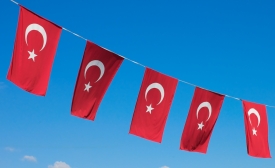aid diplomacy
In a first of its kind, al-Shabaab militants took journalists to witness al-Qaida's battle for Somali hearts and minds. It was the first time the group had spoken publicly in Somalia and the first time it had distributed aid. With thousands of destitute people facing an uncertain future, the camps are fertile ground for recruitment by radicals.
Aid's limited impact on public opinion usually applies even when the aid is specifically focused on winning converts. Aid is likely to be a more effective foreign policy tool when it comes to persuading governments to do things that lack popular support. Creating that popular support in the first place is much harder.
Turkey’s public diplomacy has gained increasing prominence in the news over the past month, even in the weeks prior to the earthquake that hit Eastern Turkey. Changes in the political landscape have resulted in significant changes to Turkey’s international standing in the world. The theme that dominated news from Turkey’s Today’s Zaman throughout the month of October was this Muslim-majority nation with a secular democratic government and a vibrant Islamic culture.
World governance in catastrophe is an element of global statecraft. But some disasters are more local, and then how an individual state responds shows its citizens, and the wider world, just how good it is at its core business of meeting basic needs. That is one reason why deciding whether to accept disaster relief is partly a matter of state self-confidence. But it is not just about bravado. Even humanitarian aid can carry a discreet price tag.
Now, as senior Republican on a key appropriations panel for foreign operations, Graham is trying to stave off funding cuts for a softer kind of power exercised by diplomats, civilian training corps and U.S. contractors who help other governments battle AIDS, modernize schools, instruct police, clean water wells and enhance their armed forces.
Evidently, China has cultivated a delicate foreign policy toward the Southeast Asian region over the years. It initially followed soft-power diplomacy by providing economic aid to various infrastructure projects and opening its domestic market for Southeast Asian manufactured products without antagonizing the region politically.
What does it mean that China's has become a global force? And more importantly, how have they actually accomplished that?
The quick answer? Through business dealings rather than military alliances, and a superb infographic from the Heritage Foundation offers a rarely seen snapshot of that.

Sherine B. Walton, Editor-in-Chief
Naomi Leight, Managing Editor
Tracy Bloom, Associate Editor
Sarah Myers, Associate Editor







